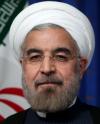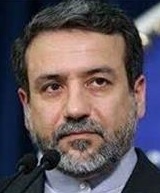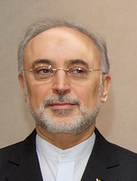Iranian officials involved in the nuclear negotiations are trying to sell the final deal at home, particularly to lawmakers. Foreign Minister Mohammad Javad Zarif framed the agreement as a win for Iran during his remarks to parliament on July 21. “For 12 years, great powers have tried to prevent an Iranian nuclear program. But today they should tolerate thousands of centrifuges spinning, plus the continuation of research and development,” Zarif said. “This shows our power.”
Iran’s parliament has the constitutional right to review and vote on the deal, but Supreme Leader Ayatollah Ali Khamenei has the final say on nuclear issues. The Iranian parliament formed a committee to study the final nuclear deal and will wait 80 days before voting on the agreement. Meanwhile, the U.S. Congress has 60 days to review the deal.
The following are excerpted remarks from Iranian officials on the deal.
President Hassan Rouhani

“Even in a football game, when we say we won the game it means we scored three goals and received two. But some folks may come and say that we could have used other opportunities to score more goals. We have to take our opponent in consideration, it is easy to sit and watch the game and demand more."
U.N. Security Council Resolution 2231 “is an unprecedented event in the history of the Islamic republic of Iran. Iran's goal was to attain its legal right to enrich uranium and today, the UNSC has explicitly accepted this."
"We were in a [football] field where our diplomats were on one side, and on the other, the six world powers were present. In this competition, the referee favored the other side; we won this competition."
"The other side claims that based on the agreement, Iran will not be able to acquire the atomic bomb in less than one year, which is a ridiculous claim because the Iranian nation has never been after the Weapons of Destruction (WMDs) and believes that such a quest is against the codes of ethics, religious jurisprudence and the fatwa (religious decree) of Supreme Leader of the Islamic Revolution (Ayatollah Seyed Ali Khamenei).”
"They have accepted ... that the sanctions have had no impacts on the Islamic Republic of Iran, and that they should give them up. All bodies who had approved Resolutions against Iran, have today annulled them, and this deserves paramount importance."
“This is a new page in history. It didn’t happen when we reached the deal in Vienna on July 14; it happened on the fourth of August 2013, when the Iranians elected me as their president.”
“How can one be an Iranian and not cheer our negotiating team?”
Foreign Minister Mohammad Javad Zarif
"Using ballistic missiles doesn’t violate the Joint Comprehensive Plan of Action (JCPOA); it is a violation of a paragraph in the annex of the (UN Security Council) Resolution (2231) which is non-binding.”
"This paragraph (of the annex) speaks about missiles with nuclear warheads capability and since we don’t design any of our missiles for carrying nuclear weapons, therefore, this paragraph is not related to us at all.”
"If for any reason, Security Council sanctions are re-imposed, Iran will not be obliged to abide by its commitments."
“It was proved that the Islamic Republic of Iran will continue resistance for many years and negotiations for two years, under hard conditions of sanctions and pressures.”
“Anger of enemies of the Islamic Republic of Iran and on top of which Zionist regime showed the strengthened might of the Islamic Republic of Iran in the region and the world. The hated Zionist regime has never been so isolated among its allies.”
Iran achieved its goals of “maintaining Iran’s dignity and might, establishing the nuclear program [of the country], enrichment and retaining the heavy-water reactor.”
“Ensuring this obvious issue (that Iran doesn’t build nuclear bombs) is no special privilege, since, based on religious and human principles and the fatwa by Leader of the Islamic Revolution [Ayatollah Seyyed Ali Khamenei], Iran has never been and never is after nuclear weapons.”
“We have never claimed and do not claim that the JCPOA is completely to the benefit of Iran; I emphasize that negotiating is basically giving [something] and taking [something in return], and unless a significant level of the two sides’ demands are met, no agreement is reached.”
“In order to meet our demands, we have had certain flexibility concerning restrictions and monitoring; this flexibility has been goal-oriented and well-calculated.”
"According to the plans, Iran is scheduled to move towards more advanced nuclear industry and commercial (uranium) enrichment.”
“For 12 years, great powers have tried to prevent an Iranian nuclear program. But today they should tolerate thousands of centrifuges spinning, plus the continuation of research and development. This shows our power.”
—July 21, 2015, in remarks to parliament
Deputy Foreign Minister Abbas Araghchi

"We have told them (the Group 5+1 - the US, Russia, China, Britain and France plus Germany) in the negotiations that we will supply arms to anyone and anywhere necessary and will import weapons from anywhere we want and we have clarified this during the negotiations.”
"We will take any necessary action to maintain and expand our defensive capabilities, safeguard our independence and sovereignty and help our regional allies to fight against terrorism."
"We are not ready to even negotiate on our security and defensive issues, let alone compromising them.”
—July 21, 2015, in remarks on state television
"The Security Council which once assumed Iran as a threat to the global peace and security based on the past resolutions, does no more consider Iran's nuclear program as a threat under the new Resolution and even recognizes Iran's enrichment and annuls the sanctions.”
"And in addition to endorsing Iran's enrichment, the Security Council also urges other countries to help Iran.”
—July 22, 2015, according to the press
Head of the Atomic Energy Organization of Iran (AEOI) Ali Akbar Salehi

"We are the only country among the 130 to 140 developing states that can export two of our strategic products to the international markets; enriched uranium and heavy water."
“Enrichment in Natanz will be maintained and the Arak reactor will remain a heavy water facility in nature."
"With the construction of the Arak modern reactor, we will not need any new reactor, and this achievement is one of the major successes… we could achieve in Vienna.”
—July 21, 2015, in remarks to parliament
Photo credits: Araghchi via Iran's Ministry of Foreign Affairs mfa.ir, Salehi via Flickr Commons (cropped)
 “Even in a football game, when we say we won the game it means we scored three goals and received two. But some folks may come and say that we could have used other opportunities to score more goals. We have to take our opponent in consideration, it is easy to sit and watch the game and demand more."
“Even in a football game, when we say we won the game it means we scored three goals and received two. But some folks may come and say that we could have used other opportunities to score more goals. We have to take our opponent in consideration, it is easy to sit and watch the game and demand more." "We have told them (the Group 5+1 - the US, Russia, China, Britain and France plus Germany) in the negotiations that we will supply arms to anyone and anywhere necessary and will import weapons from anywhere we want and we have clarified this during the negotiations.”
"We have told them (the Group 5+1 - the US, Russia, China, Britain and France plus Germany) in the negotiations that we will supply arms to anyone and anywhere necessary and will import weapons from anywhere we want and we have clarified this during the negotiations.” "We are the only country among the 130 to 140 developing states that can export two of our strategic products to the international markets; enriched uranium and heavy water."
"We are the only country among the 130 to 140 developing states that can export two of our strategic products to the international markets; enriched uranium and heavy water."